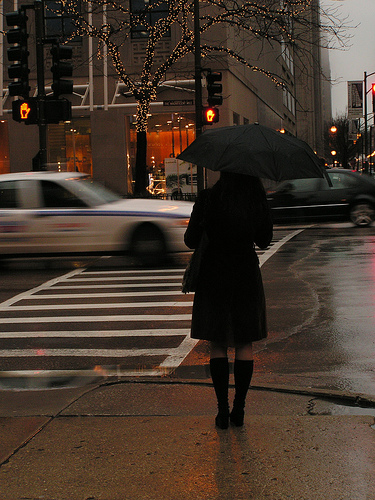Skipping Shabbos and Drawing Lines

http://www.flickr.com/incendiarymind
It’s 4pm, and I am sitting with my friend at a T.G.I. Friday’s in Philadelphia. I have chosen not to think of the day itself as Shabbos. I am skipping Shabbos day, you see; it’s just Saturday.
We’re looking to split an appetizer and then a dessert. She points out something on the menu, and I see that (like almost everything else on the menu) it includes meat. “Oh, I can’t eat that,” I say. She knows that I don’t eat non-kosher meat, but didn’t realize that particular dish wasn’t vegetarian.
I hesitate.
Because what’s the difference when my observance level is in flux lately, anyway? Where is the line? Why don’t I eat non-kosher meat? I decide to not order a dish with meat in it: I don’t want to deal with whatever feelings of guilt I may feel while eating it, or afterwards. Better to explore one big Jewish challenge at a time, starting with Shabbos—one week at a time.
See, I love Shabbos, I really do. I don’t want to give it up. But it is unclear now what the shape of that day will look like… where the lines are. The line used to be halakha, Jewish law, but I am no longer convinced that is the right metric for me for Shabbos, or for the Jewish life I want to live. Frankly, I’m not sure it ever was. I just don’t know, though. Picking and choosing is a slippery slope.
5 comments on “Skipping Shabbos and Drawing Lines”
Comments are closed.




I think there’s value to knowing what rules you’re breaking (no matter how much it matters to you that you’re breaking them). Clearly the system means something to you or is connected to your identity, even if it’s not integral right now. It can be helpful to have a structure that frames our experiences and our processing of those experiences. We don’t have to buy into or love that structure, but I find that it helps guide the questions I ask myself and what sorts of things to think about before, during, and after various experiences. (I could also understand if someone wanted to argue that there are aspects that are not addressed in this framing and that it is missing something. I may feel that way but no examples come to mind right away. I feel pretty strongly that everything is in Torah somewhere. Hafokh ba v’hafokh ba v’kula ba – Ben Bag-Bag used to say: turn it and turn it and everything is in it.)
Also, if keeping shabbos on Friday night is meaningful, then do it! There is value in every shabbosdik experience, even if it is not the traditional 25 hours.
What are you picking and choosing from, though? Some people carry umbrellas on Shabbat. I feel I see so many friends get sidetracked with “rules” they learned from rabbis, while those rabbis may subscribe to certain minchagim that don’t work for everyone. Ultimately the Torah is very basic: you shall keep the Shabbat. Whatever that actually means has been open to interpretation for thousands of years. So are you really breaking Shabbat, or are you interpreting it differently? And if you are breaking it, then are you doing so for the sake of the breaking? The sense of freedom it gives? Rebellion? Something else? I really love this post. There’s so much here!
Thanks. Now I have something to thing about.